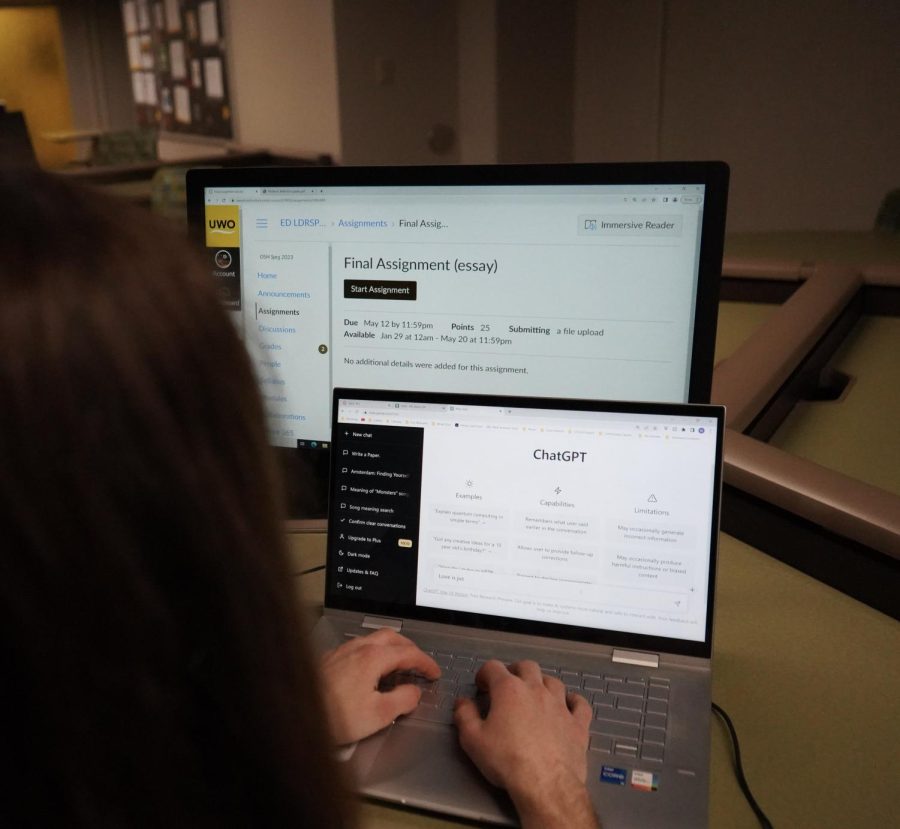ChatGPT redefines teaching at UWO
Willem Flaugher / Advance-Titan – A student uses ChatGPT to write their online assignment. Though it’s able to quickly summarize and explain complex topics, ChatGPT can be used to cheat on assignments. Some classrooms across the country have outright banned the chatbot.
April 5, 2023
More than 25% of K-12 teachers have caught their students cheating via ChatGPT, a recent study.com survey found. A third of the teachers surveyed believe ChatGPT should be banned in all schools.
ChatGPT has exploded in popularity since its release in November, especially among students, who have utilized its ability to scour billions of data points and produce a coherent, “human-like” answer.
The artificial intelligence (AI) is built on the GPT-3 interface, which utilizes 175 billion data points. Its 4-year-old predecessor, GPT-2, uses a mere 1.5 billion data points. But even with this massive step up in capability, OpenAI — ChatGPT’s parent company — is already developing the GPT-4 interface.
ChatGPT has sparked conversations among educators across the country, including at UW Oshkosh, with many professors and faculty considering how ChatGPT can be effectively utilized in classrooms and the plagiarism issues it has created.
Many of those involved in this discussion said they were caught off guard when ChatGPT was released.
“My initial reaction to this overall issue and new technology was existential shock,” one English teacher said. “I felt like this threatened the core of what I value as an educator and human — good writing encompasses so many of the best parts of being human.”
But the teacher said they accepted this technology, though it has forced them to ask questions about classical teaching methods.
“This offers me an opportunity to reevaluate why we value writing, what good writing entails and why we even continue to use the essay as a common academic assessment,” the teacher said. “I am not doing [students] any favors by blocking this technology — this is around to stay. It is exciting, thrilling and terrifying (in the truest sense of the word). Whatever it is, it is here.”
One of the primary concerns regarding ChatGPT is cheating, specifically plagiarism. The AI was able to pass law school exams, though the bot was near the bottom of the class in most subjects, earning a C+ overall grade.
A Wharton School of the University of Pennsylvania business professor subjected ChatGPT to a series of business management questions. One of his comments to ChatGPT’s answer was “Wow! Not only is the answer correct, but it is also superbly explained.”
Although the AI’s vast collection of data has simplified cheating, UWO instructional designer Sarah Bradway said that ChatGPT can be a useful tool in classrooms by acting as a supplementary resource.
“The argument regarding plagiarism is fair, and I’m sure some students will use AI in a way that isn’t exactly honest,” she said. “However, that has always been the case. It’s going to be a lifesaver for students with learning differences and those that might need some extra explanation of a concept.”
Bradway said that she’s not aware of any policies relating to the AI that would apply to the entire UWO campus. But, she said she’s encouraging instructors to devise class policies and expectations for its use.
“The protocols surrounding this type of technology are quickly and constantly evolving,” she said. “There are AI-detectors that have been released that are pretty accurate. Turnitin actually released an AI-detector today that seems to work well. If an instructor chooses to use one of these, I again encourage them to relay that information to students.”
The benefits of the chatbot outweigh the cons for many other professors, too. UWO Department of Information Systems professor Don Heath said that ChatGPT has caused him to rethink the way he approaches teaching.
“In the past, in coding classes, I would focus a good bit on teaching students to write code to answer the ‘how,’” he said. “I have shifted my focus toward the ‘why’ — the critical thinking needed to specify the shape of a solution and the specific techniques which should be used in reaching it.”
Heath said that, in some of his programming classes, he uses ChatGPT to help generate code, though it still has to be manually edited and optimized.
But the use cases for ChatGPT extend beyond the classroom. Instructional Program Manager John Bellotti used the example of his son who has dysgraphia — a neurological disorder that hinders writing ability. Bellotti said that his son can benefit from ChatGPT’s ability to generate human-like writing.
“[My son] has great ideas, he can talk through them and get them on paper through some alternate form like speech to text,” he said. “ChatGPT can help him construct those thoughts into a cohesive paper … so that the rest of us can understand his brilliance and listen to his story. Technology like this is only going to help him and others excel in a world that is not very kind to autistic people.”
Though ChatGPT has been criticized for limiting creativity, Bellotti said that it could have the opposite effect. If ChatGPT takes the burden off the parts of the brain needed to write, he suggested that those parts could instead be used to think critically about ideas.
“I understand all the arguments against ChatGPT, but I strongly suggest we consider all the benefits something like ChatGPT can provide to those that want to or … need to use something like ChatGPT so they can display to the world their intelligence, explain it to the rest of us in a manner we can all understand while using their skills and expertise to concentrate on something that they are really, really good at rather than what they’re not so good at, which might be writing,” he said.















